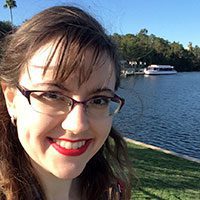By Shelly Harris, Children’s Librarian
July is Disability Pride Month! It’s been celebrated since 1990, when President HW Bush signed the Americans with Disabilities Act (ADA) on July 26, though many non-disabled people have not heard of it.
Disability Pride Month means different things to different people: honoring early activists, recognizing that their disability is intrinsic to themselves, celebrating disability visibility in public spaces, and more.
Andrew Gurza, disabled disability awareness consultant, explains it in a post on Instagram: “For me, it means that I am proud to have conversations about disability that are my honest truth; and to talk about body stuff that most of us keep to ourselves. I am proud to say ‘I hate my disability today,’ and be able to share that honestly, alongside moments where I say, ‘Being disabled is great.’ Being able to tell both sides of that story makes me proud to be disabled.”
This month, we will be exploring disabled experiences by learning from the experts: disabled people. It’s an opportunity for disabled people to find their community, and for everyone to learn about experiences, thoughts, and feelings they haven’t encountered.
Below, find videos and programs for early learners, as well as books, events, and more resources for caregivers.
Watch these videos
When you’re watching a video I’ve made about disabilities, you’re learning from a disabled person! I am neurodivergent, with a diagnosis of ADHD, and chronically ill with psoriatic arthritis. I take medication, including injections to suppress my immune system. I spent a lot of time listening to and learning from people with the same disabilities as well as others.
In this video, I talk about disabilities as a normal part of life.
Here I highlight a great board book that normalizes different ways of eating, including due to disabilities!
Explore a display in the Main Library Idea Box
Through July 26, visit the Main Library Idea Box to learn about milestones in disability rights history, quotes from disabled advocates and celebrities about their experiences, and about ways of communicating without using your mouth to speak. These are great ways to open conversations with kids about fair and unfair treatment of disabled people. More about the display »
Attend these events
Film screenings
Learning about disability history is vital for caregivers with disabled kids! We will showcase disability experiences with two film screenings:
- Saturday, July 22, 2:30 pm: Crip Camp: A Disability Revolution focuses on the disability rights protests of the 70s. Register now »
- Saturday, July 29, 2:30 pm: This Is Not About Me gives a first-person view of life as a non-speaking autistic woman and the challenges to be educated. Register now »
Dance workshop
It doesn’t matter how you move, think, learn, see, or hear: Everyone can dance! On Monday, July 24 at 3:30 pm, disabled dancers Maggie Bridger and Robby Williams will be leading an inclusive dance class for kids 5+ with or without disabilities. Register now »
Peace circle
Living with a hidden or non-apparent disability can be emotionally taxing, as people often don’t believe what they can’t see. When I tell people that I have inflammatory arthritis, being told that I’m too young doesn’t make me feel good or get me the accommodations I need! Our peace circle on Sunday, July 23, at 2 pm will be focused on healing for adults with hidden disabilities. Register now »
More supported programs for kids
Plus, of course, we will be hosting our regular children’s classes for disabled kids that we offer all year round, including storytime and gardening. Register now »
Learn from disabled people
The best way to learn about disabilities and unlearn ableism—the intentional or unintentional bias against disabled people and the accommodations they need to function independently in society—is to listen to what disabled people are saying, not their families, friends, caregivers, or educators, but disabled people.
Books to read
- Emily Ladau’s Demystifying Disability: What to Know, What to Say, and How to Be an Ally is a book of essays from a wide variety of disabled people.
- Alice Wong’s Disability Visibility is another book of essays with a wide variety of experiences.
- Judy Heumann was the mother of the modern disability rights movement. The work she did before her very recent death is immense. We’re lucky she wrote her autobiography, Being Heumann: An Unrepentant Memoir of a Disability Rights Activist, before she passed.
Social media to follow
Follow hashtags to see what disabled people think, experience, and get frustrated by. These tags are for non-disabled people to read, not to use when posting: #DisabilityAblesplained, #DisabilityTwitterTaughtMe, #AutisticJoy, #AbledsAreWeird, #ItsAccessibleBut, and #DisabilityPride.
Resources to explore
Check out these resources we’ve created at the library, such as:
- Celebrating disability awareness with books and activities,
- Resources for autistic people and caregivers,
- Information on augmentative and alternative communication and Down Syndrome, and
- Local, state, and national resources for a wide variety of disabilities.

About Shelley
Shelley is a children’s librarian with a passion for early literacy, serving and celebrating the disability community, and exploring technology. She can often be found practicing storytime songs with her black lab, Bingo.

